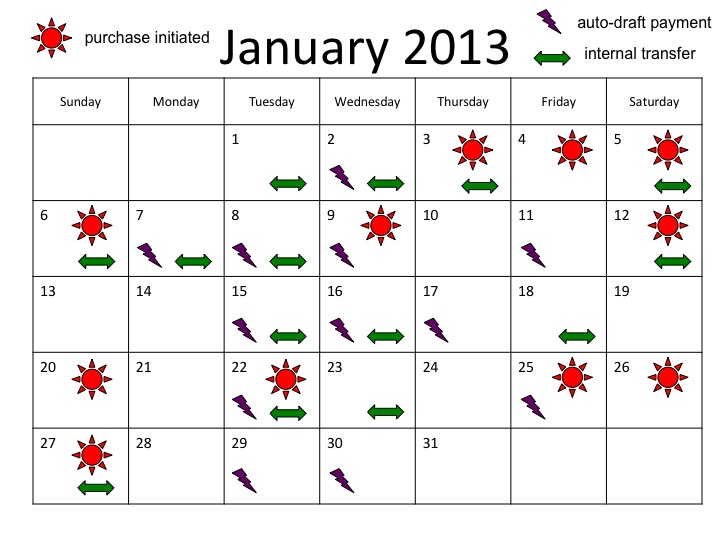How to Help Someone Who Spends Too Much
I put out a call on Yakezie for guest posts while I prepare for my preliminary exam, and Andrea Whitmer volunteered a post for today! Andrea is a single mom and full-time freelancer who writes about everything from finance to parenting at So Over This. She’s a big fan of learning to make better life decisions while maintaining a sense of humor. Thanks Andrea and I hope everyone enjoys the post!
 Until a couple of years ago, I was the world’s worst spendaholic. If I wanted something, I bought it, whether or not I could afford it. I accumulated tons of clothes, shoes, jewelry, and handbags, all while deluding myself into believing I deserved them. From credit card debt to payday loans to bankruptcy, I managed to ruin my credit by the time I was 23 years old.
Until a couple of years ago, I was the world’s worst spendaholic. If I wanted something, I bought it, whether or not I could afford it. I accumulated tons of clothes, shoes, jewelry, and handbags, all while deluding myself into believing I deserved them. From credit card debt to payday loans to bankruptcy, I managed to ruin my credit by the time I was 23 years old.
Now that I’ve escaped the trap of living beyond my means, I struggle with being overly aware of the spending habits of other people in my life. When a friend posts a picture of her new shoes on Facebook, I immediately wonder if she bought them with credit. When someone invites me to dinner, I ask repeatedly, “Are you sure it won’t mess up your budget?” And, most embarrassing of all, I have been known to turn down invitations to go shopping – not because I can’t control myself, but because I know the other person can’t. Funny how I went from overspending to being the money police in just a few years!
I have vivid memories of family members (especially my parents) and friends trying to help me get my spending on track. Even worse, sometimes they loaned me money to pay bills or buy groceries after I’d spent my entire paycheck on junk. When I see my friends’ loved ones doing the same for them, it hurts my soul – not because my friends don’t need help, but because the type of help they’re getting enables them to maintain their bad habits, just as it did for me.
Here are three ways you can help someone who spends too much without encouraging them to continue overspending.
1. Offer to help them go over their income and expenses.
From ages 18 to 27, I never once sat down and figured up how much money I had coming in versus how much went out. I didn’t balance my checkbook. I didn’t even open my bank statements. I knew deep down that I was spending too much, but I was too scared to find out how bad the problem was.
When my dad sat down with me and made me gather up all my bills, paycheck stubs, and receipts, it was like a lightbulb went off in my brain. For some reason, having him there to help me organize the chaos made it easier to face what I’d done. Once I knew exactly how much I had left over after bills, groceries, and gas to go to work, I was better able to stick to that amount without going over.
2. Never, ever, EVER give them cash.
Early in my adulthood, I went to my parents to “borrow” money every time I bounced a check or spent too much money. While I was good about using the money for what I needed – I didn’t spend grocery money on new clothes, for example – I also didn’t learn anything about changing the way I dealt with my finances. It seemed far too easy to make the same mistakes over and over when I knew I had my parents to cover me.
If you really want to help out a friend, help them directly. For instance, if they need groceries, don’t give them money; take them to the grocery store. If they can’t pay the electric bill, go with them to pay it. When my parents started doing those things, I was so humiliated I began looking for ways to avoid asking them for help (i.e. learning how to manage my finances better).
3. Don’t lecture if they aren’t ready to hear it.
I lost my relationship with one of my best friends because of my reaction when she tried to talk to me about my spending problem. In hindsight, she went about it the wrong way – she waited until she was too frustrated to be objective – but I still wasn’t able to process her assessment of me as selfish and irresponsible.
Instead of sharing unsolicited opinions, do your part to stop enabling the overspender in more subtle ways. If a friend wants to go shopping, say something like, “You know, I love spending time with you, but maybe we should rent a movie and hang out at my house.” That sends the message that you don’t want to participate in the madness without risking a big argument.
Do you have friends or family members with a spending problem? How do you handle it? Have you ever loaned money to a chronic spender and regretted it?
Filed under: mistakes, spending · Tags: intervention, overspending

 My Unfrugal Shopping Spree
My Unfrugal Shopping Spree Why We Don’t Do No-Spend Challenges
Why We Don’t Do No-Spend Challenges Average Clothes Spending and Pattern
Average Clothes Spending and Pattern Weekly Update 45
Weekly Update 45


As much as it pains me to not help a family member, we had to cut off my brother-in-laws. The one still owes us about $100 that I’ve completely written off as ever going to see again. The other always paid us back on payday, only to borrow the money the next week. We were basically a no-interest line of credit for him.
But at the end of the day, I have to remember that tough love like this is helping them more than constantly loaning them money.
I remember you mentioning that before… You’re really doing them a big favor by cutting them off, even though it may not always seem like it. (That is, unless another family member is picking up where you left off.) I have a friend who quit speaking to one of his siblings completely because he loaned several thousand dollars that was never repaid. It just makes things awkward, especially if you can’t trust that you’ll get the money back.
This all sounds so familiar! Until about 22ish, my parents would help out. However, my mom finally observed that giving me $20 here and $100 there was not helping me. She stopped the handouts because I was just never going to grow up. I hit my bottom when, at 26, I had to live with relatives because I could no longer afford living on my own. Luckily, within a year I was able to get my finances in order and I am ever so thankful for the kindness of my aunt and uncle for letting me live with them, but I NEVER want to be in that position EVER again!
It is certainly easy to judge people for their purchases especially after paying off all my credit card debt. But, even when I was in massive debt, I was judgey judge pants about people my age who still had their parents pay for their gas or groceries or lived at home. HA! I guess I thought I was superior because I always had to pay for my extras – like my car or cell phone.
I’ve told my parents before that I think they hindered me in a lot of ways without meaning to. I didn’t have a job until I finished grad school because my dad wanted me to focus on my grades. Which meant that my parents paid for my gas, car insurance, going to the movies, etc. I never had to work for anything and it gave me a false sense of security – I assumed someone would always be there to clean up after me when I messed up.
It took getting divorced and realizing that I truly had no backup plan for me to get it together and stop spending all the time. And while I really try not to judge other people, sometimes it’s hard when I see them doing the same stuff I used to do. Nothing like hard learning experiences to get a lesson across, regardless of how long it takes to get there!
Good post Andrea! I could not agree more on all of the points, especially #2. When I was mired in debt if someone gave me cash that just tempted me to spend it. Taking them to buy groceries, or helping pay a bill is much more tangible and gives more direct help. I found that the times it happened for me I always felt ashamed that I needed that help which eventually got me on the right path. We have a family member who has a similar issue, and has had it for years. It can be quite frustrating, but at the end of the day you can only do so much to help them.
I really wanted to include that in the post but I didn’t want it to be forever long – the fact that people don’t change until they’re ready to. It’s so frustrating to me now that I got my act together, but it’s true! No matter how many times I said I was tired of being broke and tired of the chaos, I didn’t change until *I* wanted to change. That’s such a hard thing to deal with from the other side, as I see now. My parents were good about not lecturing me, but they did provide a lot of advice that went right over my head until the last few years.
Those are very valid tips. You can’t help a person who is not willing to change and if you give them cash you aren’t solving the problem. First step is to get them to admit they have a problem. I would help a person who does, but not someone who keeps spending like crazy while crashing at my place and eating my food.
It’s kind of funny that you say that… I’m semi-famous for ending up with people crashing at my place and eating my food! I have a cousin staying with me right now (though his case is a little different since he recently lost his home in a fire), and my aunt was living here awhile back. In her case, she did get a job and learn to handle money once she realized I wasn’t going to pay her bills, but if I had helped her even once beyond giving her a place to stay, I know she would have taken advantage.
Oh boy I’m guilty of #2. Gave a friend $20 yesterday at class. I thought he was joking when he asked to borrow $10, he was not. I gave him the money because I was a little shocked and didn’t know what to do (he’s almost 50 and has always been a hot mess with his finances). I know I’m probably enabling his bad money habits, next time I’ll be more prepared for when he asks and will offer to take him food shopping instead.
Thinking through your answers to those tough/awkward questions before you’re confronted with them is definitely helpful. I would probably be flustered, too.
That’s a tough situation, especially if the request came from a classmate that you don’t know very well. (Not sure if that’s the case from your comment; it sounds like you might know this guy.) I’m not sure that I would know how to respond in that situation – it’s hard when someone asks directly, but I think friends are harder to turn down than family. That’s a situation where I would only give what I could easily afford to lose, because chances are good that the money will never be repaid. 🙁
I have a friend, I’m really concerned about. She has $29 in the bank, has a full time job, no debt, no kids, is 24 y/o and still can’t get her finances together. I want to help her, but I don’t know how. I feel like it’s not my place, but with someone in those circumstances she just shouldn’t be ending up like that every month.
Well at least she has the sense to not get into debt! That’s, like, half the battle right there. But there isn’t anything you can do until she decides she wants to live differently – aside from demonstrating that it is possible to live differently.
I think that might be a good time to offer to sit down with her and look at where her money is going (if you feel she wouldn’t be offended). One thing that helped me early on was opening two checking accounts – one where I left enough to pay my bills with a small buffer (AKA I didn’t touch that money because my dad helped me figure out how much I needed for bills), and a second one where I transferred the rest of my paychecks. I knew that the money in that account was what I had left to spend, and I knew I needed to keep enough in there to last for two weeks. That was super helpful in learning to control my spending without messing up my bills. Maybe that would help your friend?
I really resonate with this as my younger sister is showing some really bad spending habits. Everyone wants to help her out with cash but what we all really need to do is help get the things she “needs.” She has lead herself to believe she “needs” new shoes, every couple months. She “needs” to eat an Panera. Thanks for giving me the courage to deal with it the right way.
Thanks for reading and commenting, Lisa. I’m really glad the post was helpful! Though I could be persuaded that Panera is a need at least every now and then. 😉
It’s really difficult to rope in your spending when you get in the mindset where you “deserve” certain things. I did it for years and changing was so painful… Just know that your sister will be thankful when she does turn things around, especially if the family can band together and be strong enough not to enable her poor choices.
[…] from So Over This provided a wonderful guest post on how to help a loved one who is overspending from the perspective of the one who needs the help. I really appreciate her writing that post and […]
[…] How to Help Someone Who Spends Too Much by Jon from Money Smart Guides […]
We all know people that spend too much, we might do it ourselves sometimes. I have offered to help certain friends in developing a budget and have had good collaboration with my peers. I have also assisted in questioning whether certain purchases are necessary or just a want. Lecturing is not a good approach, they usually shut down very easily.
It’s great when people come to you for help and they are actually interested in improving in that area. You are right – lecturing an unwilling audience accomplishes nothing and may further alienate that person.